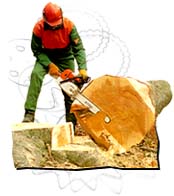 PG&E
tree cutting in Bonny Doon PG&E
tree cutting in Bonny Doon
The RBDA has been involved a lot lately in trying
to get PG&E to ameliorate its huge tree cutting program along their
60 kV line that passes through Bonny Doon.
At the RBDA meeting on Nov. 10, members voted
unanimously to support the residents of the Molina-Conifer-Robles area
in their effort to get PG&E to moderate their excessive clearing of
trees around their transmission lines, and to cease damaging and destroying
the endangered manzanita in the area. The RBDA board has helped organize
a committee working to accomplish that. That committee is known as the
Woodland Protection Group.
Its first act was to engage attorney Christopher
Dort of the firm Burton, Volkmann & Schmal to seek a Temporary Restraining
Order (TRO) against PG&E and its subcontractor which is doing the work.
 Click
here to go to the complete index of related pages. Click
here to go to the complete index of related pages.
 To get on the
email list that has up-to-the-moment information, click
here. To get on the
email list that has up-to-the-moment information, click
here.
Here are some photos, and below them are some
links to info on guidelines, policy and laws that apply to that cutting.

South of Conifer, at the intersection
of Molina, PG&E was
clearcutting a wide swath (picture
taken on October 21). Note the wide open
area in the background, compared
to the forested area in the foreground.
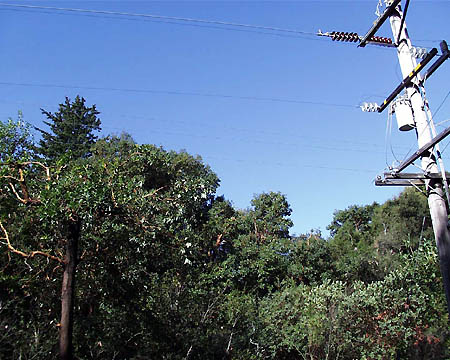
This is what a beautiful madrone along Robles Drive in
Bonny Doon looks like
after PG&E's foresters are through with it.
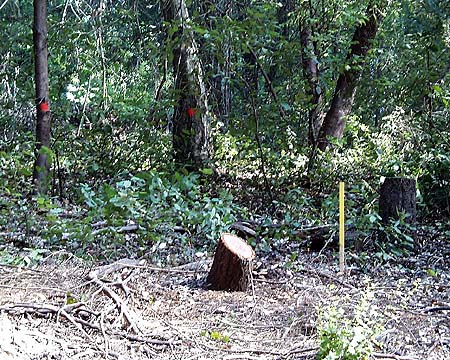
Many of the trees being cut are well outside the PG&E
right-of-way.
The ones marked with red are now gone.
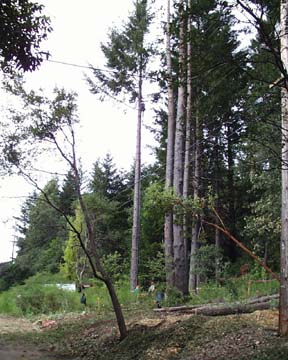
Workers for PG&E subcontractor Godon & Sons prepare
apparently healthy Douglas Firs along Molina for removal.
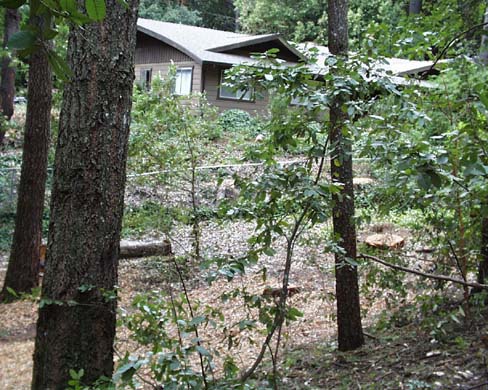
The cutting has left this once-secluded house on Molina
wide open to the road.
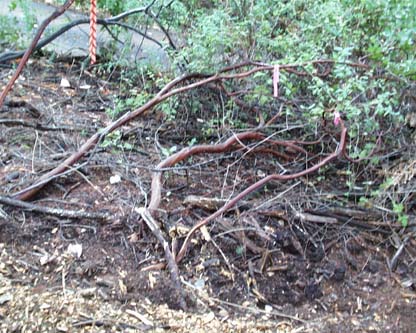
PG&E's lumberjacks have uprooted and mangled many
endangered manzanita
bushes, including this member of the Andersonia (heart-leaf)
species.
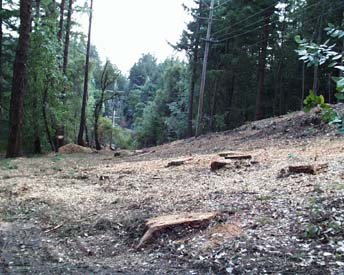
Looking south from Molina across Conifer, PG&E has
now clearcut
about a 100 foot swath around the transmission line.
They apparently have left a few trees along Conifer until
the end of the cutting so
that the true extent of the cutting won't be so apparent
until it's over.
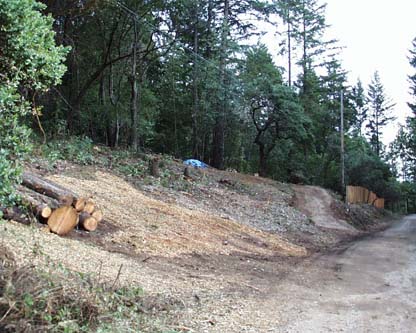
The O'Malley property at the corner of Molina and Conifer
has been among the
most heavily cut. All vegetation under the lines has
been obliterated,
exposing the ground to erosion from the winter storms.
Starting
here are some excerpts from (actually most of) a little brochure entitled:
|
California Homeowners and
Utility Companies
Understanding our shared vegetation responsibilities
A message from the CPUC and CDF
This brochure has been
created with the cooperation of the CPUC to inform you about electrical
safety, fire prevention and pertinent rules and regulations that affect
all homeowners.
The information here covers
the general rules and regulations that affect all homeowners. You can make
a difference by acting on this information. If you are interested in knowing
more, call us or your local utility.
We're Here to help!
Why do electric utility
companies prune
and remove trees near high
voltage lines?
Public safety
 To
prevent injury to people climbing or working in trees adjacent to power
lines To
prevent injury to people climbing or working in trees adjacent to power
lines
Fire Safety
 Trees in contact with high voltage power lines can act as an ignition source
of
Trees in contact with high voltage power lines can act as an ignition source
of
fires.
Reduce outages
 Trees represent one of the largest causes of power outages in California
Trees represent one of the largest causes of power outages in California
IT'S THE LAW
State law requires utility companies
to maintain specific clearances (depending on voltage running through the
line) between electric power lines and all vegetation
Homeowner liability
Failure to allow a utility company
to comply with the law can result in liability to the homeowner for damages
or injuries resulting from a vegetation hazard
Many insurance companies do not
cover these types of damages if the policy owner has refused to allow the
hazard to be eliminated.
HOMEOWNER PREVENTION
You can prevent electric outages,
fire and public safety hazards
Clearing all flammable vegetation
a minimum of 30 feet around your home and other structures provides the
greatest chance for survival and is also required by law (section 4291;
see CPUC link below)
Plant the right tree in the right
place. If you must plant trees near power lines, make sure the the maximum
mature
tree height is ten feet away from the closest power line.
Plant fire resistant plants.
Never allow children to climb trees
growing near power lines.
Never prune trees near electric
lines. Call the local electric utility company first to inspect the trees.
In many instances the utility may perform the tree work at no cost to the
homeowner.
Inspect trees on your property annually
for hazards. For expert advice on tree health or hazards, consult an International
Society of Arboriculture Certified Arborist.
|
More information:

These pages contain excerpts from the California
State Law and California Public Utilities Commission documents covering
the tree trimming required of utility companies to maintain safety around
their power lines. Click here to see these guidelines.
Click on the banner itself to go to the CPUC site in Sacramento.

also has some guidelines for a vegetation management
policy. Click
here to see those guidelines.
Contact the RBDA Board in one email
to the site links index
| back to the RBDA main page | to
the PG&E index
to the lawsuit FAQ | to
the text of the temporary restraining order
|
 PG&E
tree cutting in Bonny Doon
PG&E
tree cutting in Bonny Doon

